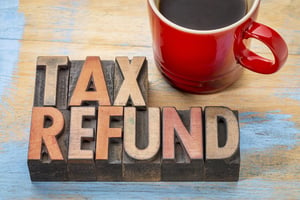 If you have not filed your taxes for the upcoming tax season, and you are thinking about filing for bankruptcy, you may wonder if you can file your taxes and keep the refund, if you are entitled to receive a refund. Whether you are able to keep your tax refund, depends in part on the type of bankruptcy that you file. It also depends on the value of your total assets and your particular financial circumstance. There are two types of bankruptcies in the bankruptcy world.
If you have not filed your taxes for the upcoming tax season, and you are thinking about filing for bankruptcy, you may wonder if you can file your taxes and keep the refund, if you are entitled to receive a refund. Whether you are able to keep your tax refund, depends in part on the type of bankruptcy that you file. It also depends on the value of your total assets and your particular financial circumstance. There are two types of bankruptcies in the bankruptcy world.
A Chapter 7 and a Chapter 13. A Chapter 7 bankruptcy is known as a “liquidation” bankruptcy. This means that any assets that are nonexempt – that is, not protected by the law, can potentially be taken from you and converted to cash to pay your creditors. Most of the time, the bankruptcy trustee will want money, in the form of a check, for nonexempt assets that are worth a lot of money. If your assets are all exempt, or protected, then you will be able to keep your assets and not have to pay any money to the trustee in order to keep them. Tax refunds are an asset in bankruptcy, just as any of your other personal property. There are two types of laws that can be applied to protect all of your property – the federal exemption laws, and the Minnesota state exemption laws. If your case qualifies to have federal exemption laws be applied to protect all of your property, then the “wildcard” exemption law is the statute that would protect your tax refund. The Minnesota state exemption laws, however, are not able to protect tax refunds. In a Chapter 13 bankruptcy, tax refunds are handled a little differently. While both a Chapter 7 and a Chapter 13 were designed as financial remedies, a Chapter 13 operates in a fundamentally different way, than a Chapter 7. A Chapter 13 operates similarly to a debt consolidation program, but there are benefits. The benefit is that your payments every month to the trustee are affordable, and there is a specific timeframe as to when you will be out of debt, which is in 3-5 years, with 5 years being the maximum timeframe. Therefore, because you are on a repayment plan in a Chapter 13, your tax refund will likely be used to repay your debts.
On the bright side, there are ways you can prevent the loss of a tax refund, if you are thinking about filing for bankruptcy. First, you can adjust the percentage of taxes that gets taken from your paychecks each pay period, so that you do not receive a tax refund. Next, the best thing you can do if you have already received your tax refund, is to spend the refund down with reasonable and necessary expenses, such as food, utility bills, car payments, etc.
It important to remember that after filing for bankruptcy, the trustee will request to see your most recently filed tax returns. If the trustee has requested that you provide copies of your most recently filed tax returns, then it is important that you provide that information to your trustee. The trustee will use tax returns to verify your income, and if your trustee does not timely receive your tax returns, he or she may request that your 341 hearing gets rescheduled, or worse, the trustee could dismiss your case.
CALL NOW FOR A FREE STRATEGY SESSION FROM A MN BANKRUPTCY LAWYER AT LIFEBACK LAW FIRM
To learn more about what you can do to protect your tax refunds, and to learn more about the importance of filing your taxes and providing your tax returns to your bankruptcy trustee, you should consult with an experienced bankruptcy attorney. See us at LifeBackLaw.com!


